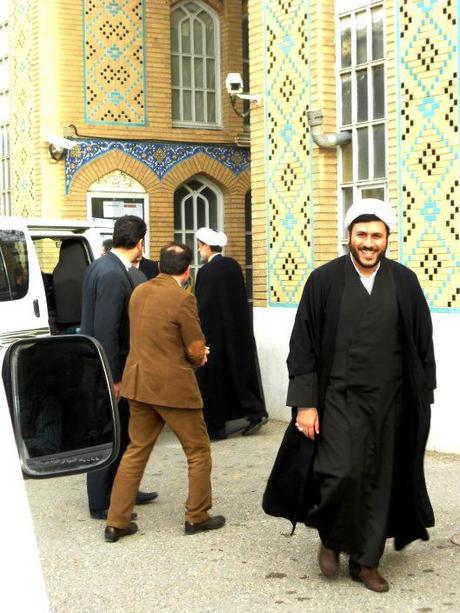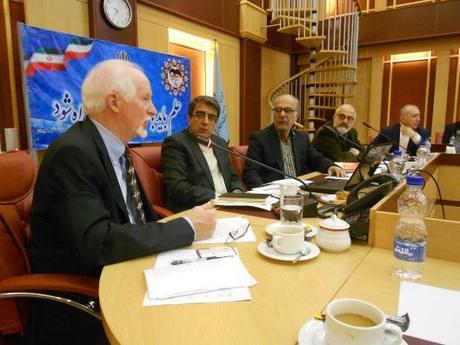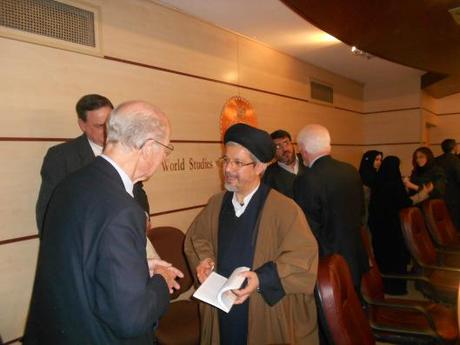As Cliff and I read comments on all three of his posts on Iran, we realized that there was a missing piece – that of more detail on the dialog. There is only so much you can fit into a blog post before losing the attention of readers, so he has continued the series with one more post.
I think this could be one of the most important posts ever published on Communicating Across Boundaries for in it we have word for word some of the concerns of a country isolated for 30 years. Please read and share as you feel appropriate.

Many of you have asked for more specific details of the conversations our delegation had with the Iranian thought leaders we met during our week in Tehran and Qom. In this post I want to go deeper into some of what was discussed during our time in Iran.
It is important to know that our delegation consisted of ten academics from ten different institutions and went to Iran as private citizens. We were political scientists, anthropologists, historians, linguists, and theologians. We were Christians, Jews and agnostics. We were Republicans, Democrats, Socialists and Libertarians. Our goal was to meet with Iranian academics, clerics and think-tank leaders. We were well aware of the chasm that has existed between our two governments, as well as the perceptions of our populations, since the Iranian revolution.
According to mediator, Douglas Noll, one of the key principles of peacemaking is the following:
“The peacemaker is charged with the sacred duty of creating a refuge where people from different backgrounds know they will be heard and understood, where their needs and ideas will be respected, and where they can safely do the difficult work of reconciling their differences.”
Each of us stepped off the plane at Imam Khomeini International with a desire to listen to our Iranian hosts but to also have the freedom and tact to ask some of the “hard questions” in our mind about Iranian human rights and academic freedom.
During the week we met at eleven different venues with over two hundred people, representing over thirty different organizations. As you can imagine that is a lot of talking, and listening and you could imagine translating. The majority of the speakers we interacted with spoke English and many of them has obtained their higher education degrees in the U.S. or Europe.
Our delegation leader, Dr. James Jennings, would begin each session with a reiteration of why our delegation had come. We were there to listen and begin a dialog between our parties. We did not represent the U.S. government or its foreign policies, but were there to discuss a wide-range of topics.
I would say that the hardest realization was to hear how isolated Iran has felt these three decades since the Iranian Revolution. We were listening to people, who for some of them, had the first opportunity to share (i.e., vent) with an American audience. I could envision years of conversations they had been having with each other about this regional and global isolation and the effects the sanctions had on their society.
As mentioned before, Iranians are passionate and vocal by nature and we were able to listen to them. Let me list a few topics that the Iranians wanted us (and vicariously other Americans) to hear:
“Your sanctions are killing us slowly, We cannot import certain chemicals to ease our traffic pollution and many of our medicines are too expensive for the general population.”
“Your academic journals are rejecting our papers and research in the name of ‘sanctions’.”
“We want to collaborate with your academic institutions.”
“We want Iranian-American exchange programs for university students.
“We want you to see how the sanctions have limited us and made us more self-reliant.
“We are proud of our Islamic Revolution and its principles.
“Our Supreme Leader has issued a fatwa stating that any nuclear bomb is anti-Islamic.”
“We are providing women with education and support. Sixty percent of our university students are women.”
“Your government is hypocritical. You talk about human rights, yet you support the country of Saudi Arabia that will not even allow its women to vote or drive cars.”
“We believe that our government needs to protect society from the ills of modernity.”
“We have challenges with our youth and joblessness.”
“We have a problem with drug smuggling from Pakistan and Afghanistan. We have over one million drug addicts that we are trying to rehabilitate.
These are the topics that members of our delegation wanted the Iranians (and vicariously their government) to hear:
“We are individual academics. We do not represent the American government or U.S. foreign policy.”
“How is your society addressing human and civil rights violations?”
“Why is your government supporting the regime of Syria and Hezbollah in Lebanon?”
“What is the status of women in your society?”
“Why can’t American tourists come to Iran and travel on their own.”
“What are your nuclear intentions? Are they just for energy purposes or for obtaining a nuclear bomb?”
“What about the freedom of religion in Iran? In the first declaration of human rights, Cyrus the Great stated in principle #4: Every man has the right to choose his own religion.”
“What is the status of Iranian Christians, Zoroastrians and Baha’i who have been imprisoned for their beliefs?”
“Many Americans want relations between Iran and the U.S. to be normalized.”
We had many honest and probing conversations with our Iranian hosts in the formal sessions and also over meals and tea. We were involved in peacemaking by trying to explain the rationale of some of the decisions made by our government, academic intuitions and journals. We listened to one another and trust that we will be able to bring more delegations to Iran and to host Iranian participants at our U.S. institutions.
Peacemaking is never clean-cut and solutions are rarely solvable in one sitting. The desire to be heard by the other party is the first step in reconciliation and rapprochement.




